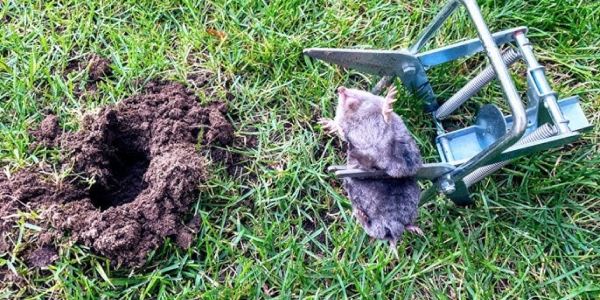Gophers in your yard are simply an annoyance. These pesky little creatures can ruin grass, the garden, and plants. Gophers are common in many places, especially in open, grassy areas where they dig burrows. However, they can also invade gardens and yards to cause problems for homeowners and gardeners. They normally uproot the plants and destroy lawns. If these unwanted guests are disturbing you in your yard, you should take action against them to stop them from further damage.
In the following article, we will discuss some effective ways to get rid of gophers in your yard.
What are Gophers?

Gophers, also called Pocket gophers, are medium-sized rodents. The unique thing about them is their fur-lined cheek pouches or pockets which they use to carry and store food, much like squirrels. Besides, they are generally known due to their large burrowing activities and the capability to cause damage to farmlands and backyards. This rodents are herbivores and thus mostly eat grass and vegetation. These animals are adapted to digging by having large claws on the front paws. Similarly, its small eyes, ears, and sensitive whiskers help them to move in darkness. Their flexible fur and partly hairy tails help them run backward almost as fast as they run forward. Pocket gophers have short fur that is brown, yellowish-brown, gray, or about the color of soil. In addition, they have large front teeth, whereby they use in digging through the soil and rocks and also in cutting roots.
How to get rid of Gophers in your yard or garden?
There are some methods of gopher control like trapping or poisoning, specifically made for gophers. Otherwise, you can use some natural repellents or electronic devices producing ultrasonic frequencies to repel these animals. Here are the best ways on how to keep gophers out of your yard and garden:
1. Garden fencing
To keep gophers out of your garden, put up a fence. Bury it at least 2 feet deep, and bend the bottom 6 inches outward to stop rodents from digging underneath. Also, extend the fence 1 foot above ground to stop them from climbing over. If you have small areas like flower beds, consider completely screening the sides and bottoms underground. For raised beds, put wire underneath the soil to keep rodents out. Additionally, you can use wire baskets around individual plants, especially when planting new shrubs and trees. Galvanized wire is a good long-lasting option for protection.

2. Try Natural Repellants
Repellents are substances to keep gophers away from a garden or yard. They may be made from natural ingredients, such as castor oil, garlic, and hot peppers, or they can contain some chemicals. Using a variety of different repellents is best so that it all can be more effective for the rodents. Gopher-repellent sprays are easily available at garden centers. You may also use home remedies things as fish emulsion, blood meal, or urine of a predator. If you do use repellent sprays, apply them repeatedly every few days, especially after a rain to keep them effective. You could set up an ultrasonic gopher-repellent stake in the garden area. This creates vibrations or sounds that gophers find uncomfortable but we can’t hear. It is solar-powered and easy to use.
3. Grow Repellant Plants
Although their eyesight is poor, gophers have a strong sense of smell. It can be used to your advantage by planting other gopher-repellent plants. Rosemary, eucalyptus, lavender, and other strongly scented plants can either serve as a deterrent or protect your garden from these creatures. On the other hand, some plants are not found delectable by rodents, such as daffodils, onions, and garlic. You might also use gopher-repelling plants around the edges of beds, like gopher spurge, lavender, and marigolds. The odor from these plants tends to deter them. These also offer a good defense against mosquitoes.
4. Live Trapping
A live trap can work quite effectively if you are dealing with gophers. Since they breed at a very high rate and breed year-round, you might need to trap them all year long. It really would be good to get a professional, one who knows how to set the traps and deal with the rodents. However, if you prefer to do it yourself, just identify the main tunnel of the gophers and set a trap inside. Use fresh vegetables, fruits, or peanut butter as bait, and check the trap often so any caught rodents can be quickly released. Always follow local regulations when trapping and relocating gophers, and never use poison baits. When handling traps, wear gloves to stay safe. After catching a gopher, release it far away from people and other gophers, as they can be aggressive with each other.

5. Predatory Animals
You can always try some of the natural ways to get rid of gophers without using any harmful methods. Rodents have a few natural predators which include owls, snakes, cats, dogs, and coyotes. Barn owls are good at catching rodents, and having them on your premises will help to reduce the number of gophers. You can attract the barn owls into your premises by setting up owl nesting boxes. Likewise, the gopher snakes also eat gophers. Further, the presence of dogs and cats in your surroundings can also make the gophers feel unwanted and hence leave the place. However, one must be very careful as some pets may try catching the gophers which is dangerous as gophers carry diseases.
6. Maintain your Lawns or Gardens
Keep the edges of your garden clear of weeds to make it less inviting for gophers. Gophers are less likely to enter your garden if there is no food available to attract them. To further discourage them, treat your lawn to control earthworms and other potential gopher food sources. Also, frequently clean up any fallen fruits and vegetables. By reducing these food sources using either chemical treatments or mechanical methods, you can make your garden and lawn less attractive to rodents. If possible, remove the weedy areas next to your yard or garden to create a buffer zone of less hospitable habitat.
Also read, Get Rid of Raccoons in Your Garden and Yard
Frequently Asked Questions
1. What damage do gophers cause?
Gophers uproot plants, destroy lawns, and do extensive digging that breaks up the soil, possibly destabilizes it, and destroys roots.
2. How can I keep gophers out of my garden?
You can keep gophers away by installing a fence buried at least 2 feet deep with an outward bend at the bottom. For small areas, use wire baskets around plants and screen raised beds with wire underneath the soil.
3. What are some organic ways to repel gophers?
Some natural repellents are castor oil, garlic, and hot peppers. You can also use ultrasonic repellent stakes that emit sounds gophers dislike. Regularly apply these repellents and consider using gopher-repellent plants like rosemary or daffodils.
4. Is life trapping an effective way to control gophers?
Yes, live trapping can be effective. Set traps in the main gopher tunnels and bait them with vegetables, fruits, or peanut butter. Regularly check the traps and follow local regulations for trapping and relocating gophers.
5. Can natural predators help control gophers?
Natural predators like owls, snakes, cats, dogs, and coyotes can help reduce gopher numbers. Installing owl nesting boxes and having pets around can be effective. However, be cautious as some pets might try to catch gophers, which can be risky due to disease.
